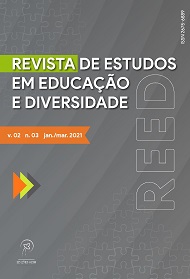INCLUSION IN EDUCATION AND TEACHER TRAINING IN PERSPECTIVE: AMONG OLD DILEMMAS AND CONTEMPORARY CHALLENGES
DOI:
https://doi.org/10.22481/reed.v2i3.8093Keywords:
Inclusion in Education, Emancipation, Teacher trainingAbstract
This article constitutes an effort to foster reflection on teacher training that has been possible, and how this progress in the training process has marked the inclusion in education, especially with regard to welcoming students with disabilities into regular classrooms. We debate aspects related to the dimensions of society, culture, education and training are mainly based on the Critical Theory of Society, especially represented by Theodor Adorno's thinking. We also highlight some authors who dedicate themselves to the themes of teacher training and inclusion in education, such as Ainscow, Damasceno, Carvalho, Costa, allowing the inter (faces) proposed in the epistemic fabric of the text. Our final remarks point to the challenges posed to all resistance teachers in times of pseudo-democracy in Brazil, which implies the understanding that a truly inclusive society supposes, first of all, the recognition of the phenomenon of social exclusion as a feature of contemporary society.
Downloads
References
ADORNO, T. W. Educação para Emancipação. Rio de Janeiro: Paz e Terra, 1995.
______. Notas marginais sobre teoria e práxis. In: ADORNO, T. W. Palavras e sinais: modelo crítico. 2.ed. Petrópolis, RJ: Vozes, 2003.
AINSCOW, M. Tornar a educação inclusiva: como esta tarefa deve ser conceituada? In: FÁVERO, O. et al. (Org.). Tornar a educação inclusiva. Brasília: UNESCO, 2009.
AMARAL, L.A. Sobre crocodilos e avestruzes: falando de diferenças físicas, preconceitos e sua superação. In: AQUINO, J. G. (Org.). Diferenças e preconceitos na escola: alternativas teóricas e práticas. São Paulo: Summus, 1998.
BRASIL. Constituição da República Federativa do Brasil. Brasília: Imprensa Oficial, 1988. Brasília, D Plano Nacional de Educação Especial 1977/79. Rio de Janeiro: CENESP, 1998.
BUENO, J.G. Educação Especial Brasileira: integração/segregação do aluno diferente. 2 ed. Ver. São Paulos: EDUC, 2004.
DAMASCENO, A. R. A formação dos professores e os desafios para a educação inclusiva: as experiências da escola Municipal Leônidas Sobrino Pôrto. Dissertação (Mestrado). Programa de Pós-Graduação Stricto Sensu em Educação, Universidade Federal Fluminense, 2006.
COSTA, V. A. Formação e Teoria Crítica da Escola de Frankfurt: trabalho, educação, indivíduo com deficiência. Niterói, RJ: EDUFF, 2005.
______. Os processos de Inclusão dos alunos com necessidades educativas especiais: políticas e sistemas. Rio de Janeiro, Ed. da UNIRIO, 2007.
FREIRE, P. Conscientização: teoria e prática da libertação – uma introdução ao pensamento de Paulo Freire. São Paulo: Cortez & Moraes, 1979.
______. Pedagogia da Autonomia: saberes necessários à prática educativa. 52. Ed. Rio de Janeiro: Paz e Terra, 2015.
FREUD, S. O mal-estar na civilização. Edição Standard Brasileira das Obras Psicológicas Completas. Rio de Janeiro: Imago, 1996.
GONÇALVES, A.F. et al. Observatório Nacional de Educação Especial e a Formação de Professores. In: VICTOR, S. L; OLIVEIRA, I. M (Org.). Educação Especial: políticas e formação de professores. Marília: ABPEE, 2016.
HOBSBAWM, E. A era dos extremos. O breve século XX. 1914-1991. São Paulo; Companhia das Letras, 2005.
MENDES, E. G. Deficiência mental: a construção científica de um conceito e a realidade educacional. 1995. 387f. Tese (Doutorado). Programa em Pós-Graduação em Psicologia. Instituto de Psicologia, Universidade de São Paulo, São Paulo, 1995.
NASCIMENTO, A.D. Contemporaneidade: educação, etnocentrismo e diversidade. In: LIMA, A.S. de.; HETKOWSKI, T.M. (Org.). Educação e contemporaneidade: desafios para a pesquisa e a pós-graduação. Rio de Janeiro: Quartet, 2006.
PEÇAS, A. Uma escola acolhedora, uma educação inclusiva. In: LINHARES, C.; TRINDADE, M. de N. (Org.). Compartilhando o mundo com Paulo Freire. São Paulo, Cortez, 2003.
SALGADO, S. S. Inclusão e Processos de Formação. In: SANTOS, M. P dos; PAULINO, M. M. (Org.). Inclusão em Educação: culturas, políticas e práticas. 2. Ed. São Paulo: Cortez 2008.
Downloads
Published
How to Cite
Issue
Section
License
You are free to:
Share - copy and redistribute the material in any medium or format; Adapt - remix, transform, and build from the material for any purpose, even commercially. This license is acceptable for Free Cultural Works. The licensor cannot revoke these freedoms as long as you follow the terms of the license.
Under the following terms:
Attribution - You must appropriately give credit, provide a link to the license, and indicate if any changes have been made. You may do so in any reasonable way, but not in a way that suggests that you or your use is endorsed by the licensor.
There are no additional restrictions - You cannot apply legal terms or technological measures that legally restrict others to make any use permitted by the license.






